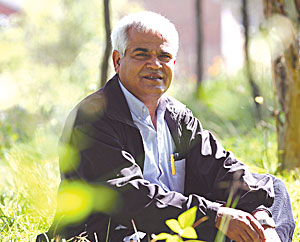 KIRAN PANDAY |
Himal: What is a federal system?
Krishna Khanal
Each province has its own organs-legislative, executive and judiciary. These provinces can function independently and are also autonomous. They don't have to wait for the central government to pass acts and regulations. In short, there are two governments-central and provincial-under a federal system.
Can you clarify the differences between decentralisation and federalism?
They might sound similar to most people, which is natural because discussions have not yet started in this regard. But they are completely different in philosophy and concept. Federalism delegates power to the people of a province, whereas the central government gets power from the people. In a way, the federal set-up is bottom-up approach, which is quite the opposite of decentralisation where power is delegated from the centre to the periphery.
Why do we need federalism?
Federalism is required in our country due to the structure of society. The previous system could not address the ethnic, lingual and cultural diversity of our society. People's aspirations gradually started rising and there was no other way to address them. Federalism is a means to address all sorts of aspirations.
Is federalism the only way to address ethnic, lingual and cultural diversity?
Federalism recognises individual identity. But this identity is not necessarily ethnic or linguistic. Switzerland is a small country but there is ethnic and linguisitc diversity which is addressed through a federal system. India is a big country with wide diversity. Therefore, it adopted federalism.
Are there other reasons for Nepal to become a federal state?
It is also necessary for the country's development. Decentralisation could not bring development. Those representatives elected from the villages settle in Kathmandu and live a life of luxury. Decentralisation cannot be meaningful as long as the leadership is centralised. Therefore, federalism is necessary to expedite development activities and ensure the participation of the people.
The development and utilisation of existing natural resources is not possible in a unitary state. Take Karnali for instance-rich in natural resources but reliant on food sent from Kathmandu. In a federal structure, there will be internal competition within the provinces. Some provinces have potential for tourism and others for water resources. It is federalism which opens avenues for competition.
There are 101 ethnic groups in Nepal. Should we have as many provinces?
This is not logical. It is the argument of those against federalism. It is not possible to give each ethnic group a state or province. We can create provinces in a manner to include major ethnic groups.
Then what do we do with the smaller groups?
We always have alternatives. For them, we can create 'cultural councils' within a province, which is widely practised in countries that have adopted federalism. Some even talk about sub-provinces. But it is impractical to create an autonomous sub-province for each ethnic group.
Decentralisation to some extent can address this issue at VDC level. Nepal cannot sustain too many provinces.
Doesn't the breakup of Yugoslavia show that federalism is not always the answer?
The federal system of Yugoslavia was not based on democratic norms, values and systems but on a communist system and principles. It was the same case in the Soviet Union. The party was run centrally while the state was federal. These are examples of how a politburo-controlled federalism fails. Democracy is the first condition in federalism.
Is federalism not necessary in relatively homogeneous countries like China?
In principle, China is running under a unitary system, not a federal one. By the time Hong Kong was returned, it adopted a 'one country, two systems' policy. Now we can say it has adopted a 'one country, three systems' policy as there are separate policies for Hong Kong, Macau and mainland China. There are autonomous regions for minorities within mainland China, for instance in Tibet and inner Mongolia.
Most countries become republics either after independence from colonialism or after winning a war. Are there countries where federalism was discussed as we are doing now?
Federal states have been established in two ways: sovereign states which had to unite for some reason, for example the USA, where there were 13 separate states under British colonial rule.
The previously unitary state of Belgium went federal in 1993. Voices were raised over ethnic, lingual and cultural issues in 1970, which continued to escalate and there was fear of the country breaking up in 1980. They created a new constitution in 1993 with a federal republic.


